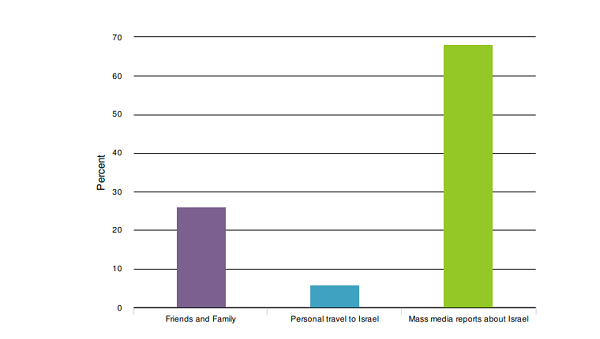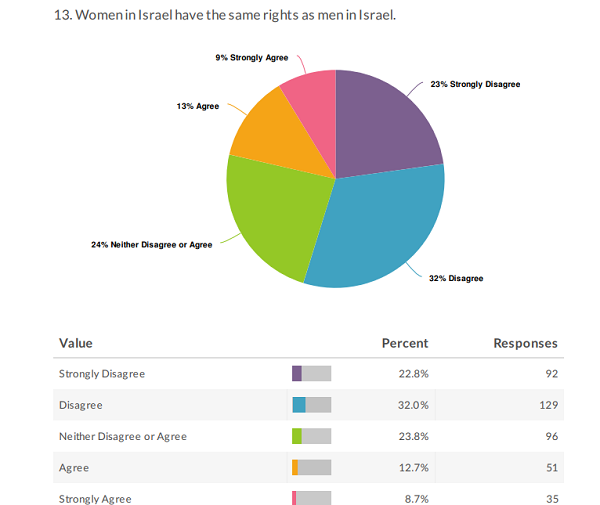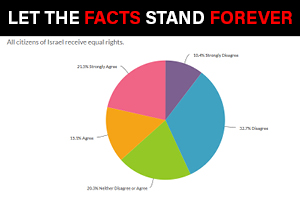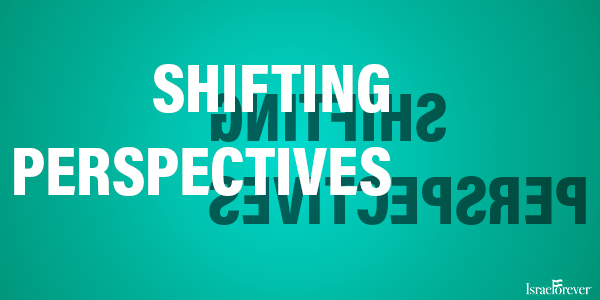Mass Media and Personal Bias
By Sarah Weinberger
I remember a story my mom told me when I was younger that affected me tremendously as I was growing up. My mom had a pen pal. The two would send letters back and forth for many months. Eventually, they decided to meet up and wanted to send each other pictures of themselves to see what they looked like. This woman knew my mom was Jewish, and after seeing her picture she replied with “Where are your horns?”
This story has always made me laugh. How could someone think that Jews had horns? How could this woman be so uninformed and misled? This concern led me to wonder if students at my university had the same misunderstanding of Jews. I was also eager to know if my peers were knowledgeable about foreign countries, especially Israel, the birthplace of the world's major religions.
I was given an amazing opportunity to do a case study at my university, the University of Alabama, and to research students’ perceptions of Israel. My study was conducted from March-May 2019. The school's diverse population serves as an excellent testing ground for millennials and Generation Z’s knowledge of Israel.
I started my case study process by randomly sending out a survey link. I got a total of 403 completed responses and about 200 partial responses. There were 79.1% of students ages 19-21 and an overwhelming 74.5% of these respondents were female. A majority of respondents were white (89.8%) and 25.3% of respondents were Roman Catholic, 22.2% were non-denominational Christian, 14.8% were Jewish, and 12.4% were atheists. The internet was reported as the most used media type (81.9%) among respondents, where 68.2% of students got their news from mass media reports.

I created 14 questions that assessed the students’ perception of Israel. The questions ranged from Israel’s education system to religion. When asked whether Israel has equal rights, 43.1% of all students disagreed. Interestingly enough, 35.7% of students disagreed with the statement that the country has freedom of religion. Almost half of the respondents believed that Israel has an advanced education system (40.4%) and that Israel is technologically advanced (44.7%).
There were 38.7% of students that neither agreed or disagreed that Israel has a strong economy, as well as 38.5% neither agreed or disagreed that Israel has advanced healthcare standards and medical facilities. There were 39.6% of students that were not knowledgeable on Israel’s type of government. Surprisingly, 54.8% of respondents do not think women have the same rights as men in Israel and 49.3% did not think Israel was a peaceful country.

The majority of surveyed students had negative perceptions regarding Israel or they were not properly educated about the country. I cannot deny that I was shocked by the extent to which the 500+ respondents felt confident in their highly uneducated opinions, especially about Israel.
Younger generations are getting most of their news from mass media reports, most of which lack correct knowledge. Millennials and Generation Z are in an age of technology where 41% of their news comes from social media. This can lead to exposure to falsified information and a consequent misunderstanding of areas outside their immediate surroundings. The case study I conducted highlights the lack of factual knowledge regarding the Middle East and Israel, and its effect on this population.
Dictionary.com defines fake news as “false news stories”, often spread as propaganda on social media. Mainstream media has become increasingly polarized and since it is easier than ever to set up a ‘news’ site online, false stories are able to spread quicker and more widely than ever before. The popularity of social media makes it easier for fake news stories to ‘go viral’ before anyone can verify their legitimacy. These mass media reports are often antisemitic and fuel violence and hate towards Israel.
A photo surfaced on social media of an “IDF Soldier” pointing a gun at a Palestinean teenager. The photo circulated negative press on Israel. Later, another photo was leaked of the same “IDF Soldier” and the Palestinian teenager taking a selfie with one another. Once this photo was released to debunk the claim, people had already formed their own opinions on the matter, so changing them would be a difficult task.

It is easier to educate students that are not informed on the subject rather than attempt to change their preconceived negative perceptions. It is also crucial to educate Jewish millennials and Generation Z about their heritage so they are equipped with the ability to fight negativity and antisemitism.
Strengthening your knowledge of your own religion, culture, and history will deepen your connection with Judaism. People might attack your roots or your religion in writing, but their information is usually based on fake news that you can learn how to recognize. In my determination to debunk false claims about Israel, I wanted to create a way for others to learn how to spot a fake media site and detect if sources are reliable.
Identifying a fake site or news item is easy, once you know what to look for:
- The first place to check when deciding if an article is true is the URL. Strengthening your knowledge about URLs and domain names will make it easier to combat fake news.
- The next step is to learn about the source of the news article. Many times websites will duplicate the style of well-known news agencies and use the same logo and fonts, but supply incorrect information.
- After checking the source of the article, check out its references. Authors will typically incorporate graphics, quotes from bystanders, or points of data from their research to support their claims. When you are reading articles, make sure the author uses evidence from logos, facts and data, rather than pathos, emotions and personal opinions – this way you are avoiding information that has been reported from an overly biased place.
- Authors can also be selective with their reporting and not disclose all the facts, causing further bias. The best way to combat this negativity and antisemitism is to be informed.
Educating the coming generations on mass media bias is crucial so they can create informed opinions and carry them into the future. Coming from an area where Israel is thought to be dangerous and misunderstood, it is my duty to show the unbiased, apolitical truth. I want everyone to have the ability to create their own well-rounded, educated opinions on Israel.
Recommended for you:
About the Author









